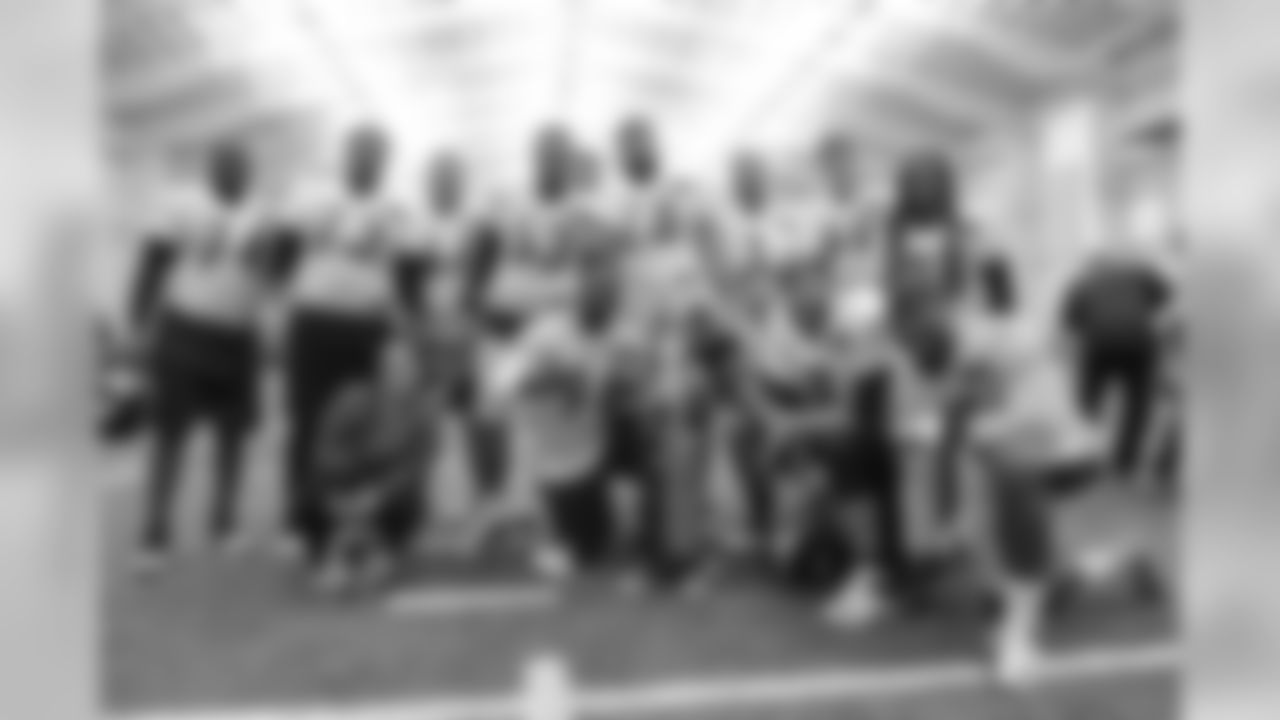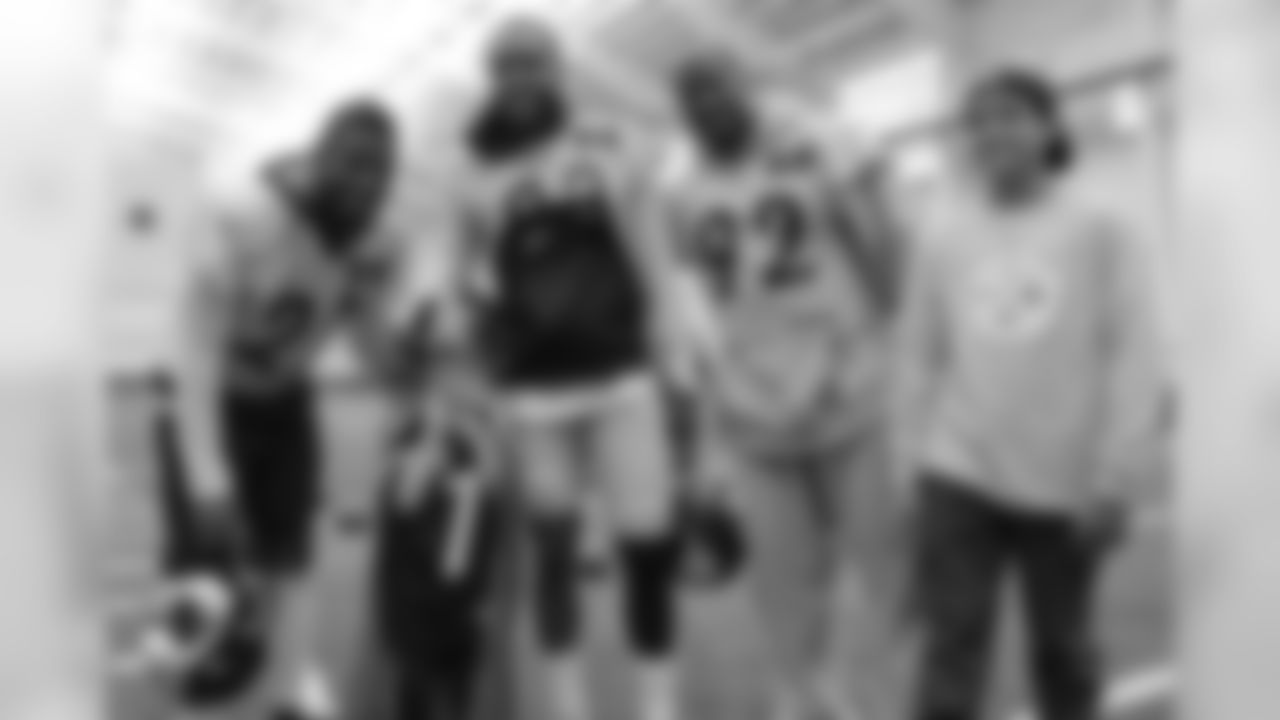Q. When a back rushes for over 200 yards in an NFL game, what has had to have gone wrong defensively?
The Steelers grant the wish of a young fan from West Palm Beach, Florida.















A. It's usually a combination of things. Time of possession is a big element of it. You have to possess the ball in order for a back to run for yards like that, and that was the case in Miami last weekend – when they had possession of the ball for 36-and-a-half minutes. And over the course of the game the defense has to get worn down, which usually means you're probably not converting third downs on offense.
Q. Do there have to be some long runs mixed in, too, for a back to get to 200?
A. Most certainly. Usually, those long runs are the result of breakdowns in schematics, or missed tackles, and/or both. More times than not, it's usually both.
Q. Are you disappointed at all in the play of the defense through six games?
A. Yes, I am. But in some aspects I'm pleased. I try not to waste a lot of time at this time of the year judging those feelings or emotions, because it's not conducive for us to win the next game. The big thing we need to do is acknowledge areas where we fall short, acknowledge areas and things we're doing well and use that information to increase our chances of winning the next time out. So, feelings of satisfaction or feelings of disappointment are less important than the actual facts associated with them.
Q. Are those facts used to guide your work with the team moving forward?
A. I'm sure it's a factor, but it's probably a minimal one. The substantial things, the tangible things, are the things of significance.
Q. We've talked about the difference between play-the-ball defensive backs and play-the-man defensive backs, and how you're either one or the other. Who are the ball-guys from this group?
A. Will Gay is a play-the-ball guy, has always been a play-the-ball guy. I think that's what attracted us to him. I think back to his senior year at Louisville, and I believe he had five or six interceptions. He had a ball in his hands in Miami in the early portion of that game – we were up, 8-3 – and he didn't make the play. Just because they're a ball-guy doesn't mean they catch every single ball that comes their way. A ball-guy or a man-guy speaks more to mentality. Will Gay is a definite ball-guy. Mike Mitchell is a definite man-guy.
Q. What about some of the younger guys?
A. We're still trying to discover some of those guys. Artie showed signs of being a ball-guy simply because of his production at Miami. He was a six-interception guy a year ago, and it was one of the attractive things about him during draft preparation. He's displayed that consistently in practice to the extent of this journey thus far this year. So far, it hasn't shown up in a stadium. Hopefully, it's this weekend.
**
Q. You've had to prepare for a game with Landry Jones as the starting quarterback before, and you did it again this week. How is he different as a player this time around?**
A. I don't know that he is. I think there's a greater comfort in terms of the men who work with him and around him, because of shared experience. But in terms of his approach, he's a very cerebral player, a steady-eddy guy in terms of his approach. His preparation is very similar to what it was.
Q. It wasn't exactly Rockne giving the "win one for the Gipper" speech, but some of his teammates said Landry spoke up in the Wednesday morning meeting. You have said one of the things you like about this team is that it's a close group. How might you expect a close group to respond to him and this situation?
A. We've talked openly about it. When you're in Landry's position, it's all eyes on him and everyone is critiquing what he does and how he does it. But that's not the mentality of this group as we step into the stadium this weekend. Our job is to make his job easier. What can we do to assist him? That's the question we're openly asking ourselves – from the men who are in the huddle with him to the assistant coaches to the offensive quality control guy to myself. Everyone else is spending a lot of time evaluating his play or the quality of his play or what he's doing. We're not going to waste one iota of time in that area. We're going to ask ourselves: "What can we do to help him?" We're not going to minimize our roles in that, we're going to maximize our roles in that. That's what a team does when a guy is faced with the kind of challenge Landry is faced with this week.
Q. I understand you view it as elevator music, but you're not being given much chance to win this game. Is there a "no respect" card to be played here?
A. Yes, but that's low-hanging fruit. That's only going to sustain you for a short period of time once you burst open that locker room door. The "no respect" card is one that's time-tested, but the more you get hit in the mouth, the more mistakes you make, it becomes less significant. I think we better hitch our wagon to tangible things. Preparation. Trust in one another. And putting together a plan and the execution of the plan that's going to produce results.
Q. You have described the New England defense as a hybrid. What does that mean?
A. They're very multiple. They're flexible. And they have the people to allow that to happen. They're capable of being a 4-3 team. They're capable of being a 3-4 team. And it's guys like Rob Ninkovich and Jabaal Sheard who provide that. If you think about Sheard specifically: he was a college defensive end who converted to NFL outside linebacker. And those hybrid body types are essentially what allow them to be that multiple. And it's nothing new for them. You can harken back to the days of Willie McGinest and guys like that. Chris Slade. They've been a hybrid group for a long, long time.
Q. What kind of problems do these two tight ends – Rob Gronkowski and Martellus Bennett – pose to a defense?
A. They are matchup problems. Both guys are matchup problems. Often times, too savvy and athletic for linebackers to cover, and big-bodied for a defensive backs to cover. The fact that there are too of them just multiplies the issues. We've had this conversation repeatedly already this year about receiving tight ends, but very rarely have you talked about that in the form of two guys in the same offense. That should give you an indication of the potential issues their presence causes.
Q. Who is their key guy on defense?
A. It's Jamie Collins. He's the guy in the middle. He's the guy really in all personnel groupings. He's the guy who is the hub of the wheel.
Q. What stat, outside of the final score and turnover ratio, is going to end up being the most revealing in terms of which team wins this game?
A. Time of possession. We have to limit our exposure to Tom Brady. Part of doing that is us converting third downs on offense. Us getting off the field when given the opportunity on defense. And largely all of that is going to be displayed in a nutshell in the time of possession.














